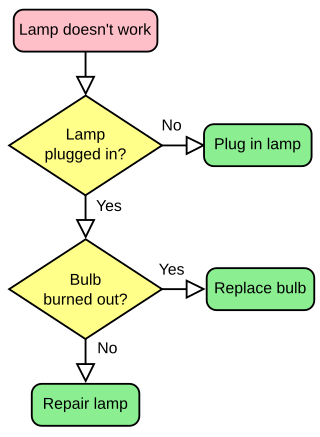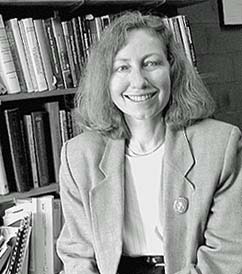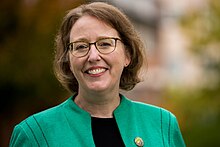
A cognitive bias is a systematic pattern of deviation from norm or rationality in judgment. Individuals create their own "subjective reality" from their perception of the input. An individual's construction of reality, not the objective input, may dictate their behavior in the world. Thus, cognitive biases may sometimes lead to perceptual distortion, inaccurate judgment, illogical interpretation, and irrationality.

In psychology, decision-making is regarded as the cognitive process resulting in the selection of a belief or a course of action among several possible alternative options. It could be either rational or irrational. The decision-making process is a reasoning process based on assumptions of values, preferences and beliefs of the decision-maker. Every decision-making process produces a final choice, which may or may not prompt action.

Numeracy is the ability to understand, reason with, and apply simple numerical concepts. The charity National Numeracy states: "Numeracy means understanding how mathematics is used in the real world and being able to apply it to make the best possible decisions...It's as much about thinking and reasoning as about 'doing sums'". Basic numeracy skills consist of comprehending fundamental arithmetical operations like addition, subtraction, multiplication, and division. For example, if one can understand simple mathematical equations such as 2 + 2 = 4, then one would be considered to possess at least basic numeric knowledge. Substantial aspects of numeracy also include number sense, operation sense, computation, measurement, geometry, probability and statistics. A numerically literate person can manage and respond to the mathematical demands of life.

Paul Slovic is an American professor of psychology at the University of Oregon and the president of Decision Research, a collection of scientists from all over the nation and in other countries that study decision-making in times when risks are involved. He was also the president for the Society of Risk Analysis until 1984. He earned his undergraduate degree at Stanford University in 1959 and his PhD in psychology at the University of Michigan in 1964 and has received honorary doctorates from the Stockholm School of Economics and the University of East Anglia. He is past president of the Society for Risk Analysis and in 1991 received its Distinguished Contribution Award. In 1993, he received the Distinguished Scientific Contribution Award from the American Psychological Association, and in 1995 he received the Outstanding Contribution to Science Award from the Oregon Academy of Science. In 2016 he was elected to the National Academy of Sciences.

Gerd Gigerenzer is a German psychologist who has studied the use of bounded rationality and heuristics in decision making. Gigerenzer is director emeritus of the Center for Adaptive Behavior and Cognition (ABC) at the Max Planck Institute for Human Development, Berlin, director of the Harding Center for Risk Literacy, University of Potsdam, and vice president of the European Research Council (ERC).
Health psychology is the study of psychological and behavioral processes in health, illness, and healthcare. The discipline is concerned with understanding how psychological, behavioral, and cultural factors contribute to physical health and illness. Psychological factors can affect health directly. For example, chronically occurring environmental stressors affecting the hypothalamic–pituitary–adrenal axis, cumulatively, can harm health. Behavioral factors can also affect a person's health. For example, certain behaviors can, over time, harm or enhance health. Health psychologists take a biopsychosocial approach. In other words, health psychologists understand health to be the product not only of biological processes but also of psychological, behavioral, and social processes.

Ziva Kunda was an Israeli social psychologist and professor at the University of Waterloo known for her work in social cognition and motivated reasoning. Her seminal paper "The Case for Motivated Reasoning", published in Psychological Bulletin in 1990, posthumously received the Scientific Impact Award from the Society of Experimental Social Psychology. Kunda authored the book Social Cognition: Making Sense of People.
The affect heuristic is a heuristic, a mental shortcut that allows people to make decisions and solve problems quickly and efficiently, in which current emotion—fear, pleasure, surprise, etc.—influences decisions. In other words, it is a type of heuristic in which emotional response, or "affect" in psychological terms, plays a lead role. It is a subconscious process that shortens the decision-making process and allows people to function without having to complete an extensive search for information. It is shorter in duration than a mood, occurring rapidly and involuntarily in response to a stimulus. Reading the words "lung cancer" usually generates an affect of dread, while reading the words "mother's love" usually generates a feeling of affection and comfort. The affect heuristic is typically used while judging the risks and benefits of something, depending on the positive or negative feelings that people associate with a stimulus. It is the equivalent of "going with your gut". If their feelings towards an activity are positive, then people are more likely to judge the risks as low and the benefits high. On the other hand, if their feelings towards an activity are negative, they are more likely to perceive the risks as high and benefits low.

Lisa Feldman Barrett is a Canadian-American psychologist. She is a University Distinguished Professor of psychology at Northeastern University, where she focuses on affective science and co-directs the Interdisciplinary Affective Science Laboratory. She has received both of the highest scientific honors in the field of psychology, the William James Fellow Award from the Association for Psychological Science for 2025, and the Award for Distinguished Scientific Contributions from the American Psychological Association for 2021. Along with James Russell, she is the founding editor-in-chief of the journal Emotion Review. Along with James Gross, she founded the Society for Affective Science.
Vimla Lodhia Patel is a Fijian-born Canadian cognitive psychologist and biomedical informaticist.
Alice M. Isen was an American psychologist and Professor of Psychology and of Marketing at Cornell University. A prominent and widely published scholar, her research concerned the influence of "positive affect" on social interaction, thought processes, and decision making, including applications to organizational behavior, medical decision making, doctor-patient interaction, issues in services marketing, and issues related to brand equity and loyalty.
Geoffrey Beattie is a British psychologist, author and broadcaster. He is Professor of Psychology at Edge Hill University and in 2023 was appointed Visiting Scholar at the Oxford Centre for Life-Writing (OCLW) and Wolfson College, University of Oxford. He has also been visiting professor at the Bren School of Environmental Science and Management, University of California Santa Barbara. He graduated with a First Class Honours degree from the University of Birmingham and a PhD from Trinity College, Cambridge. He is a Fellow of the British Psychological Society, a Fellow of the Royal Society of Medicine and a Fellow of the Royal Society of Arts.
Fuzzy-trace theory (FTT) is a theory of cognition originally proposed by Valerie F. Reyna and Charles Brainerd to explain cognitive phenomena, particularly in memory and reasoning.
Graph literacy is the ability to understand information that presented graphically, which are including general knowledge about how to extract information and make inferences from different graphical formats. Although related, graph literacy is distinct from other forms of literacy in the sense that it relates more specifically to one's ability to obtain meaning from information presented graphically. It can include the storage of mental representations in long-term memory, knowledge about the properties of different types of formats, and procedures to interpret them. However, similar to other types of literacy, higher graph literacy is associated with higher education levels and suggests that developing the skills required to interpret graphical information requires knowledge that is acquired through formal education and experience.

Sander L. van der Linden is a Dutch social psychologist and author who is Professor of Social Psychology at the University of Cambridge. He studies the psychology of social influence, risk, human judgment, and decision-making. He is particularly known for his research on the psychology of social issues, such as fake news, COVID-19, and climate change.
Valerie F. Reyna is an American psychologist and Professor of Human Development at Cornell University and an expert on false memory and risky decision making.

Dolores Albarracín is a psychologist, author and professor of psychology and business based in Pennsylvania. She is Professor of Communication at the University of Pennsylvania. She is known for her work in the fields of behavior, communication and persuasion. Her contributions have had implications for the scientific understanding of basic social psychological processes and communication policy, especially in the area of health.
Adriana Galván is an American psychologist and expert on adolescent brain development. She is a professor of psychology at the University of California, Los Angeles (UCLA) where she directs the Developmental Neuroscience laboratory. She was appointed the Jeffrey Wenzel Term Chair in Behavioral Neuroscience and the Dean of Undergraduate Education at UCLA.
Gretchen Chapman is a cognitive psychologist known for her work on judgment and decision making in health-related contexts, such as clinical decision making and patient preferences, preventive health behavior, and vaccination. She is Professor of Social and Decision Sciences at Carnegie Mellon University. Chapman served as an Editor of the journal Psychological Science and is a Fellow of the Association for Psychological Science.

Climate communication or climate change communication is a field of environmental communication and science communication focused on discussing the causes, nature and effects of anthropogenic climate change.










